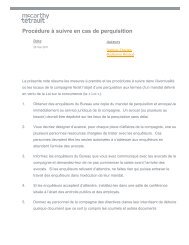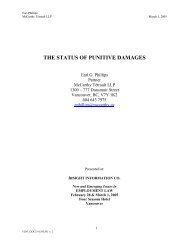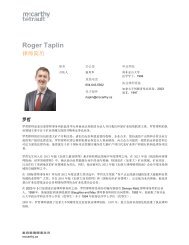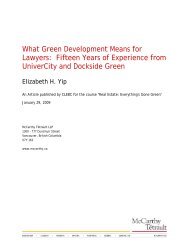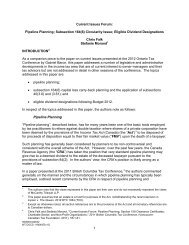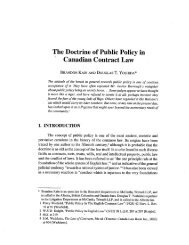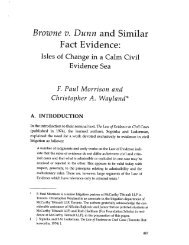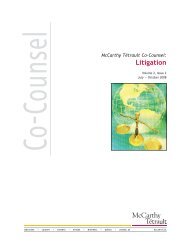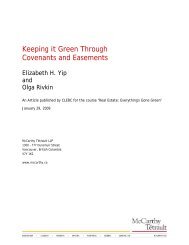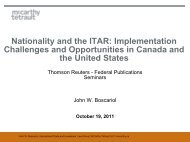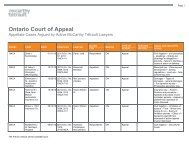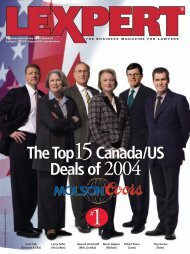1. COMPETITION - McCarthy Tétrault
1. COMPETITION - McCarthy Tétrault
1. COMPETITION - McCarthy Tétrault
You also want an ePaper? Increase the reach of your titles
YUMPU automatically turns print PDFs into web optimized ePapers that Google loves.
The objective for implementing number portability is to facilitate the<br />
process for customers to switch from one operator to another. This, in turn,<br />
should enhance competition in the market. Under the newly implemented<br />
regulations, a mobile number is ported when a customer enters into a<br />
subscriber agreement with a new operator and receives a new SIM-card.<br />
The old subscriber connection remains operable until the new connection<br />
with the new operator is activated. Any additional services requested by<br />
the customer must be agreed to separately with the new operator, as the<br />
existing services will not transfer with the number. In practice, the<br />
subscriber is not charged for porting a number, since the law prohibits the<br />
former operator from charging the customer for the change. The former<br />
operator may, however, collect from the new operator a one-off payment<br />
equivalent to the costs of porting the phone number if the technical<br />
process of porting the number generates one-off costs. At the same time,<br />
the one-off payment cannot be so high as to deter the use of the service.<br />
While the new operator can pass on the costs of the port to the customer,<br />
in practice the new operator does not do so.<br />
According to the regulation, any delay in providing a connection to a new<br />
subscriber when the number is ported may not exceed five working days.<br />
The regulation further provides that the so-called "black-out" period<br />
between closing the old subscriber connection and opening a new<br />
connection may not exceed ten minutes. Customers' eagerness to change<br />
operators has caught most mobile phone operators by surprise, and has<br />
lead to severe delays in the time limits set for the change. FICORA has<br />
repeatedly emphasized the operators' duty to attend to their obligations<br />
and has issued a deadline for the operators to comply with the regulations.<br />
After the deadline of 6th October 2003, FICORA may consider imposing a<br />
conditional fine to those operators that still fail to meet the time limits.<br />
For more information visit:<br />
http://www.ficora.fi/englanti/tele/puhelinnumeron_siirrettavyys.htm<br />
or contact: craig.thompson@roschier.com<br />
MEXICO<br />
ANTITRUST CONCERNS:<br />
IMPLEMENTING SOUND REGULATION<br />
Many problems faced by the telecommunications sector today derive from<br />
the incumbent's abuse of power. Previously, we discussed the reasons<br />
why the Dominance Rules imposed on TELMEX a couple of years ago<br />
failed and were overturned. We have not discussed, however, what the<br />
qualifications of any regulatory agency in charge of governing antitrust<br />
matters in this sector should be, so that its resolutions can both withstand<br />
the test of judicial tribunals and afford legal certainty to all players in the<br />
Mexican market.<br />
Two agencies are involved in the process of determining the existence of<br />
substantial power in the relevant market and imposing specific obligations<br />
on the incumbent. On the one hand, the Mexican Federal Antitrust<br />
Commission (the "COFECO") is in charge of implementing the Mexican<br />
Federal Antitrust Law (the "LFCE") by determining the relevant markets<br />
and substantial power of the economic agent. Once COFECO makes such<br />
a determination, the Mexican Federal Telecommunications Commission<br />
(the "COFETEL") is in charge of imposing specific obligations against the<br />
incumbent.<br />
Deficiencies have arisen in the past precisely in the determination of the<br />
relevant market and substantial power. Under current regulations,<br />
COFECO has broad powers to interplay with different economic variables<br />
to determine what the relevant market is and what products, if any, may<br />
serve as adequate substitutes thereof. This discretionary power affects the<br />
"incumbent" insofar as it is unable to know beforehand the elements that<br />
will be considered by COFECO in its analysis, thus leaving it in a state of<br />
judicial uncertainty. A lack of clear and specific regulations as to the<br />
powers of the authorities, and of the standards for imposing penalties or<br />
other administrative sanctions, have been recurring deficiencies that were<br />
brought before Mexican courts to combat administrative resolutions and<br />
the constitutionality of the laws. If COFETEL will be in charge of imposing<br />
specific obligations, and if COFETEL is the agency that is most likely to<br />
have the necessary elements to make a thorough analysis in the<br />
determination of the relevant market and the substantial power, antitrust<br />
matters in the telecomm sector should be vested primarily in the hands of<br />
COFETEL, even if the administrative act through which the antitrust activity<br />
is condemned is made by COFECO. Naturally, this would require an<br />
amendment to the current antitrust and telecom regulation to include<br />
specific testing parameters and broaden COFETEL's powers participate in<br />
the analysis of the markets and the relevant market.<br />
The current draft of the new Federal Telecommunications Law aims to<br />
amend some of the deficiencies listed above by including specific criteria to<br />
determine the existence of a dominant player in the relevant market.<br />
However, COFETEL's actions are still limited to merely advisory activities<br />
to COFECO, which the latter may disregard with or without cause.<br />
For more information visit: www.cfc.gob.mx<br />
or contact: aam@bstl.com.mx<br />
TURKEY<br />
DOMINANCE IN THE MOBILE TELECOMS MARKET<br />
In a landmark decision, published in the Official Gazette on 22nd July<br />
2003, the Competition Authority (the "Authority") imposed a 7 trillion TL<br />
(approximately eur 4.5 million) fine on Turkcell, a major GSM services<br />
provider in Turkey. The Authority found that Turkcell was abusing its<br />
dominant position in the market to prevent the growth of other companies.<br />
The decision was rendered upon complaints made to the Authority by<br />
Basari Electronic ("Basari"), one of the former largest cell phone<br />
distributors, and Telsim, another GSM services provider that felt subject to<br />
Turkcell's domination from 1994 to 2000.<br />
The companies' complaints were based on Turkcell's dominance in the<br />
GSM services market. Basari claimed that Turkcell had applied dissimilar<br />
conditions to equivalent transactions. Turkcell placed Basari at a<br />
competitive disadvantage both by requesting a fee for the line and the sale<br />
of a SIMcard with a cellular phone, and by not paying the "sale support<br />
bonus" that they formerly paid to Basari. Turkcell had continued to pay this<br />
bonus to other distributor companies, which thus caused an increase on<br />
the prices of phones sold by Basari as compared to those of other<br />
companies. Telsim claimed that the major owner of Turkcell, Cukurova<br />
Holding, wrongly perceived the two separate GSM operating market and<br />
GSM devices market as one, which made it impossible for Telsim to enter<br />
into the market.<br />
The Authority provided a detailed analysis of how dominance in the<br />
relevant market should be determined. First, it pointed out that market<br />
share is a strong indication, but is not itself determinative, of dominance in<br />
the given market. On the other hand, evidence that market shares are<br />
consistently much higher than those of competitors' for a prolonged period<br />
strongly suggests dominance. Additionally, in a market where competitors<br />
are also trying to increase their subscribers' use of data and voice<br />
communication, the total values of such use should be considered to<br />
determine whether a company is in a dominant position. Accordingly, the<br />
fact that Turkcell had 8,037,000 subscribers, where, as of July 2000,<br />
ISSUE 22 SEPTEMBER – OCTOBER 2003 2



